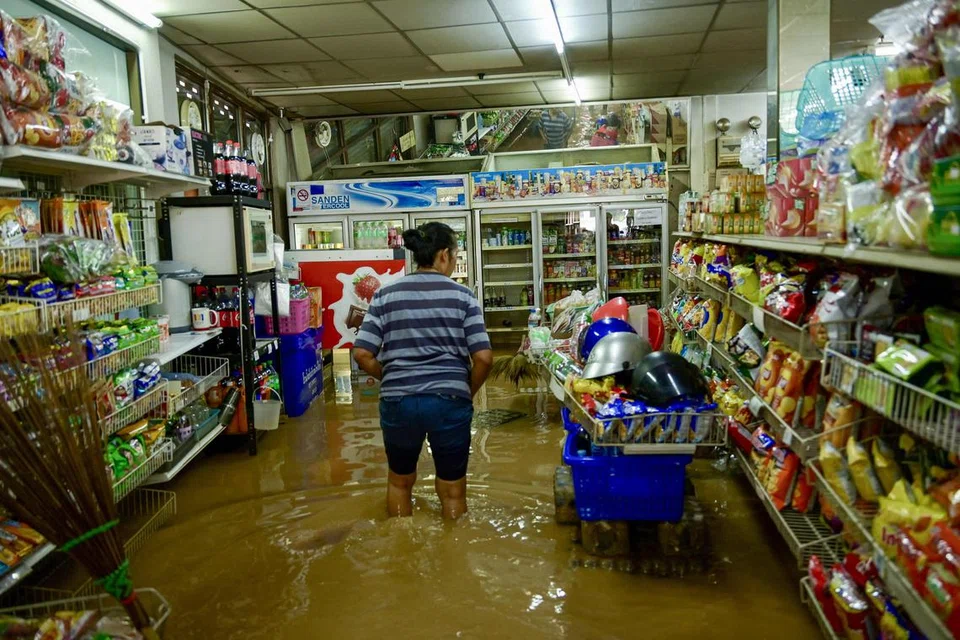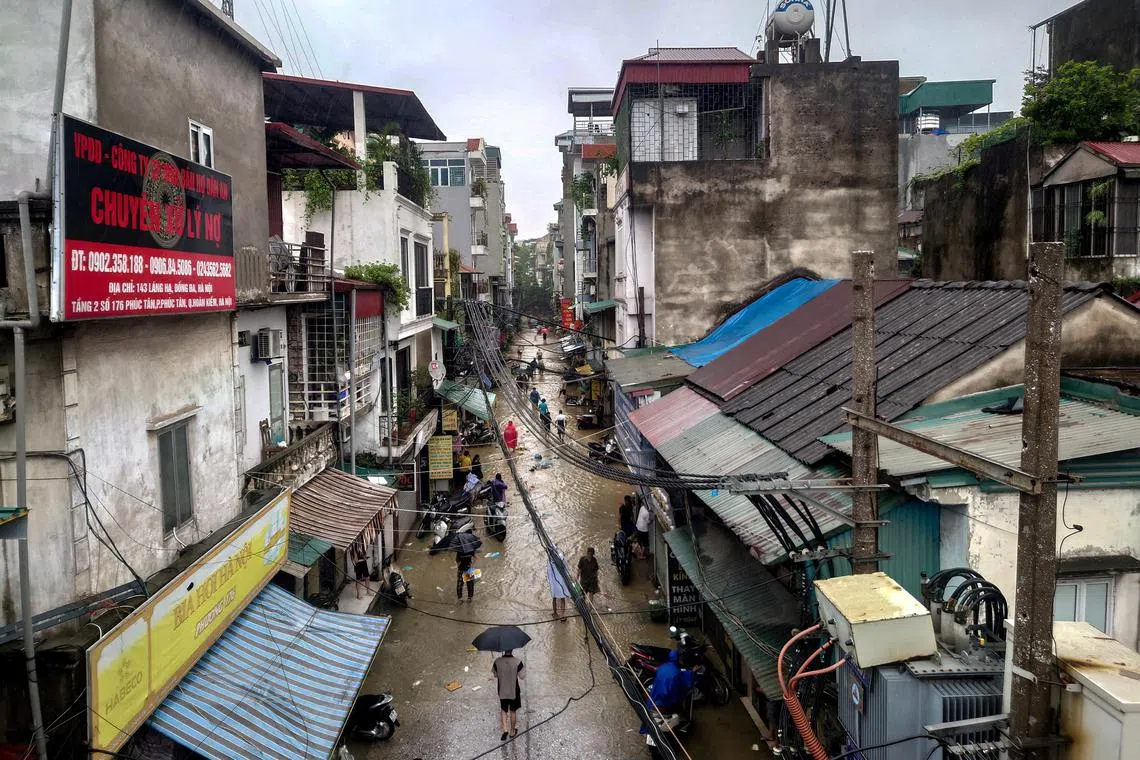Commentary
Why the IPCC’s upcoming special report on cities matters for South-east Asia
Winston Chow and Mukesh Gupta
Winston Chow and Mukesh Gupta
STRAIT TIMES

A resident wading through flood waters at a convenience store in Chiang Mai on Oct 6 after Typhoon Yagi swept through Northern Thailand in September.
UPDATED Dec 30, 2024
SINGAPORE – In September, Typhoon Yagi swept through Vietnam, the Philippines, Northern Thailand and Laos, leaving a trail of death and destruction in its wake.
Millions living in cities across the region watched helplessly as water breached their front doors and flooded their homes.
The South-east Asian region is highly vulnerable to climate change, with millions of people living in low-lying coastal cities.
Rapid urbanisation in South-east Asia also brings added urgency, with a significant estimated increase of today’s urban population from 335 million to 542 million by 2050.
As such, cities such as Bangkok, Manila and Kuala Lumpur will experience growing demands on infrastructure, housing and resources, all while facing rising sea levels and more extreme weather events.
But, at the same time, cities also have tremendous potential to develop and implement climate solutions.
Other than the Singapore Green Plan 2030, which is the city-state’s blueprint for sustainability, other South-east Asian cities have also taken the lead in urban climate action.
Penang, in Malaysia, has implemented comprehensive green initiatives like the Penang Green Agenda, focusing on waste reduction, renewable energy and urban biodiversity.
The coastal city of Semarang, Indonesia, has adopted inclusive community-driven approaches to reduce its urban flood risk from flooding and sea level rise, in addition to developing solar and waste-to-energy plants as renewable energy options.
This duality of cities – being at greater vulnerability and risk to climate impacts but also having an influence on stopping the causes of global warming – means that it is critical for policymakers to have the most up-to-date science on what climate adaptation and mitigation actions can work in this context.
The Intergovernmental Panel on Climate Change (IPCC), the UN’s top climate science body, will be releasing an upcoming special report on climate change and cities, scheduled to be released in 2027.
This report is not just another climate document – it hopes to be a tailored guide for cities in regions like South-east Asia to navigate their specific climate challenges, providing critical information such as successful cases of climate risk and emissions reduction, among others.
How cities are affected by climate change
This is the first time cities will be the focal point of a dedicated report.
Previous special reports focused on other contexts, such as the impact of climate change on the oceans and the cryosphere – the frozen parts of the planet – as well as on land.
But cities are hot spots of emissions and climate impacts and, at the same time, constitute the convergence of key actors in mitigation, innovation and resilience.
More on this Topic

A flooded street in the aftermath of Typhoon Yagi in Hanoi, Vietnam, on Sept 11.

A resident wading through flood waters at a convenience store in Chiang Mai on Oct 6 after Typhoon Yagi swept through Northern Thailand in September.
PHOTO: AFP
UPDATED Dec 30, 2024
SINGAPORE – In September, Typhoon Yagi swept through Vietnam, the Philippines, Northern Thailand and Laos, leaving a trail of death and destruction in its wake.
Millions living in cities across the region watched helplessly as water breached their front doors and flooded their homes.
The South-east Asian region is highly vulnerable to climate change, with millions of people living in low-lying coastal cities.
Rapid urbanisation in South-east Asia also brings added urgency, with a significant estimated increase of today’s urban population from 335 million to 542 million by 2050.
As such, cities such as Bangkok, Manila and Kuala Lumpur will experience growing demands on infrastructure, housing and resources, all while facing rising sea levels and more extreme weather events.
But, at the same time, cities also have tremendous potential to develop and implement climate solutions.
Other than the Singapore Green Plan 2030, which is the city-state’s blueprint for sustainability, other South-east Asian cities have also taken the lead in urban climate action.
Penang, in Malaysia, has implemented comprehensive green initiatives like the Penang Green Agenda, focusing on waste reduction, renewable energy and urban biodiversity.
The coastal city of Semarang, Indonesia, has adopted inclusive community-driven approaches to reduce its urban flood risk from flooding and sea level rise, in addition to developing solar and waste-to-energy plants as renewable energy options.
This duality of cities – being at greater vulnerability and risk to climate impacts but also having an influence on stopping the causes of global warming – means that it is critical for policymakers to have the most up-to-date science on what climate adaptation and mitigation actions can work in this context.
The Intergovernmental Panel on Climate Change (IPCC), the UN’s top climate science body, will be releasing an upcoming special report on climate change and cities, scheduled to be released in 2027.
This report is not just another climate document – it hopes to be a tailored guide for cities in regions like South-east Asia to navigate their specific climate challenges, providing critical information such as successful cases of climate risk and emissions reduction, among others.
How cities are affected by climate change
This is the first time cities will be the focal point of a dedicated report.
Previous special reports focused on other contexts, such as the impact of climate change on the oceans and the cryosphere – the frozen parts of the planet – as well as on land.
But cities are hot spots of emissions and climate impacts and, at the same time, constitute the convergence of key actors in mitigation, innovation and resilience.
Developed nations must uphold historical climate responsibilities, says S’pore
The upcoming IPCC special report on cities will provide a much-needed road map, with strategies tailored to urban contexts, allowing cities to scale successful models and share insights.
The IPCC’s work might seem complex, but understanding its process is key to appreciating the importance of this special report.
The IPCC draws on the voluntary expertise of thousands of scientists and practitioners worldwide, synthesising diverse insights into comprehensive reports that guide global climate policy and action.
The IPCC is divided into three working groups. Working Group I deals with the physical science basis of climate change, Working Group II with climate change impacts, adaptation and vulnerability, and Working Group III with climate change mitigation.
Working Group II is split into two offices, one in Singapore and one based in Delft, Netherlands.
We, in the Singapore-based technical support unit of the IPCC, together with Delft, have been tasked to lead the report and are keen to ensure that this special report is as inclusive as possible.
That aspiration underpins our aim to actively involve experts, urban practitioners and civil society in developing the report.
There are multiple opportunities to participate, and we are inviting early-career scientists, urban planners and regional policymakers to contribute insights and perspectives, ensuring that the report reflects the unique challenges and opportunities faced by cities in diverse physical, spatial and social contexts.
We hope that these efforts will foster a stronger sense of ownership among urban stakeholders in the region and beyond, to ensure that they feel represented by the report, and make its findings more relevant for action.
The upcoming IPCC special report on cities will provide a much-needed road map, with strategies tailored to urban contexts, allowing cities to scale successful models and share insights.
The IPCC’s work might seem complex, but understanding its process is key to appreciating the importance of this special report.
The IPCC draws on the voluntary expertise of thousands of scientists and practitioners worldwide, synthesising diverse insights into comprehensive reports that guide global climate policy and action.
The IPCC is divided into three working groups. Working Group I deals with the physical science basis of climate change, Working Group II with climate change impacts, adaptation and vulnerability, and Working Group III with climate change mitigation.
Working Group II is split into two offices, one in Singapore and one based in Delft, Netherlands.
We, in the Singapore-based technical support unit of the IPCC, together with Delft, have been tasked to lead the report and are keen to ensure that this special report is as inclusive as possible.
That aspiration underpins our aim to actively involve experts, urban practitioners and civil society in developing the report.
There are multiple opportunities to participate, and we are inviting early-career scientists, urban planners and regional policymakers to contribute insights and perspectives, ensuring that the report reflects the unique challenges and opportunities faced by cities in diverse physical, spatial and social contexts.
We hope that these efforts will foster a stronger sense of ownership among urban stakeholders in the region and beyond, to ensure that they feel represented by the report, and make its findings more relevant for action.

A flooded street in the aftermath of Typhoon Yagi in Hanoi, Vietnam, on Sept 11.
PHOTO: REUTERS
A call to action
A report that offers solutions is key as we need science to be translated into decisions that can help cities achieve their sustainability targets.
Cities will not reach their climate goals without the support and active engagement of those who live, work and make decisions within them.
For policymakers, the responsibility of building sustainable cities lies largely with those who shape policies and allocate resources.
The special report will encourage policymakers to implement progressive policies that both reduce physical climate risk and promote low-emissions living by default.
Imagine a city where energy-efficient housing is the standard, public transportation is widely accessible and affordable, and green spaces are integrated into every neighbourhood. Such environments reduce the need for individual emissions-related decisions and make climate-friendly living the norm.
For urban practitioners, such as architects, engineers and urban planners, and scientists, they have the expertise to reimagine cities in ways that are functional, resilient to climate risk and sustainable in lifestyle.
The IPCC report will provide these professionals with the scientific evidence needed to design and implement urban infrastructure resilient to heat, droughts, floods and other hazards, ensure energy efficiency and renewable energy, and incorporate nature-based solutions into urban landscapes.
Cities are made by and for the people who live in them, and urban residents can play a crucial role by supporting sustainable local initiatives, advocating for green policies and making low-carbon choices in their daily lives.
2024 wrapped: The biggest environment stories of the year, and what’s nextThe year’s worst climate news you have not heard about
By sharing regional insights, the special report will provide a toolkit of best practices, showing cities how to tackle climate challenges in ways that resonate with local contexts.
Now is the time for urban residents, businesses, civil society organisations, policymakers and professionals to get involved.
For residents, this means staying informed, advocating for policies that prioritise sustainability and participating in local climate initiatives.
For policymakers and urban practitioners, it means contributing to the report’s recommendations to create environments where people and nature can thrive together.
Ultimately, the cities we shape today will determine the lives we lead tomorrow.
The IPCC special report on cities is a call to action for all of us to harness the full potential of our cities in the climate fight, ensuring that they are resilient, inclusive and sustainable for generations to come.Dr Winston Chow is the co-chair of Working Group II of the UN’s leading climate science body, the Intergovernmental Panel on Climate Change. Dr Mukesh Gupta is the science officer of the working group, which focuses on climate change impacts, vulnerabilities and adaptation. Both authors are based at Singapore Management University, and their research looks into climate resilience and strategies to adapt to climate change.
No comments:
Post a Comment